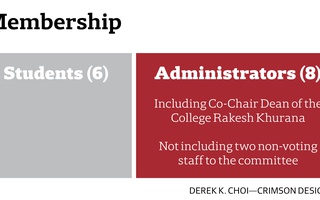{shortcode-1067b4645829d73c1ea45233ef04721075c86651}The committee that proposed a ban on social groups at Harvard College will consult with faculty and students before releasing a final revised report on Sept. 25, according to an email sent to faculty Wednesday morning.
Last month, the committee, charged with reevaluating Harvard’s year-old social group penalties, recommended that the College forbid students from joining all “fraternities, sororities, and similar organizations”—including co-ed groups—with the goal of phasing out these groups by May 2022.
Committee co-chairs Music professor Suzannah E. Clark and Dean of the College Rakesh Khurana wrote in the email that the committee will consult with faculty and students about the contents of the report in the early weeks of the fall term before revising the document. The committee’s work is meant to revise or replace Harvard’s existing penalties on social group membership; the committee will now begin to revise the revisions it initially proposed.
In its 22-page report, the committee had labeled its recommendations “preliminary” and announced its plans to hold “open faculty discussions” before presenting the report to University President Drew G. Faust. The Crimson reported in early July that only seven members of the 27-member committee had voted for the social group ban during the committee’s deliberations, renewing concerns from some Faculty members about how the College was formulating its social group policy.
The committee plans to hold three drop-in faculty-only discussion sessions on Sept. 11, Sept. 14, and Sept. 15 in buildings across campus, according to the email.
“The purpose of these meetings is to give the faculty an opportunity to discuss with members of the Committee the preliminary recommendations, to ask questions about the report, to offer constructive criticism of the report, or to share any new ideas faculty may have,” the email reads.
Several committee members will be present at each of these meetings, and the committee plans to install a record-keeper who will summarize what was said for later “review” by the full committee. In their email, Clark and Khurana also invited faculty members to provide feedback via email.
The committee intends to solicit further feedback from several other faculty bodies including the Faculty Council, the Committee on Student Life, the Task Force on Inclusion and Belonging, the Administrative Board, and the Education Policy Committee. Clark and Khurana noted that students sit on three of these committees and wrote that “feedback” from these students “will also be taken into consideration.”
The Office of Student Life will gather broader student feedback in the “coming weeks,” seeking “substantial engagement for enhancing Harvard College student social life and life in the Houses,” according to the email.
Some Harvard faculty have long charged that administrators’ attempts to regulate undergraduate social life have gone forward without adequate faculty input. The faculty committee, though created in part to address these concerns, has also drawn criticism from professors who feel they are being left out of the process.
In particular, professors say they are concerned that—as laid out in the committee’s original report—Faust, and not the Faculty, will have final say over the social group recommendations.
“We look forward to further faculty consultation about the Committee’s recommendations in the fall term ahead of our final report,” Khurana and Clark wrote in closing.
—Staff writer Hannah Natanson can be reached at hannah.natanson@thecrimson.com. Follow her on Twitter @hannah_natanson.Read more in College News
Justice Department May Join Admissions Lawsuit Against Harvard, Experts Say

















